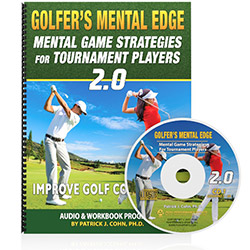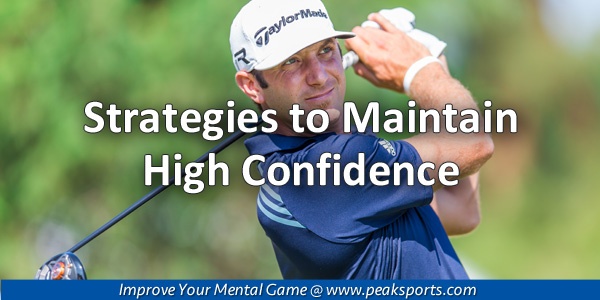Maintaining High And Stable Confidence
How would you score if you played with consistently more confidence?
Imagine how much more you would enjoy the game of golf when playing with high confidence…
Golf confidence, for some players, seems more elusive than a hole-in-one. These golfers find it difficult to maintain a steady confidence level.
Just when these golfers seem to play well, one unlucky bounce or one bad swing drains their hard-earned confidence.
And, as every golfer knows, it’s impossible to score consistently well when you lack confidence in your abilities.
You know how it goes…
You head to the course to play a round.
A part of you wonders what’s in store for today’s round… Your last round was horrendous…
Well, anyway, you had a decent week of practice so maybe you will bust out a decent score.
Your first two holes are pretty good…You drove the ball well and made par.
You were feeling good standing over the third tee.
With one swing, you hit your drive into the trees.
All those negative feelings came flooding back…
“Why can’t I do anything right? Here we go again!”
Frustration, anger and hopelessness flood your body. Your play becomes worse over the next few holes.
Your short-lived confidence hits rock-bottom again.
How does this happen?
How does confidence seem to be a roller-coaster ride for some golfers?
You probably get frustrated thinking, “I work hard on improving technique and spend a lot of time practicing.”
Practicing is important to success…
But how much time do you spend training your confidence?
The answer is probably little, if any at all…
If you neglected your putting game or spent no time on the greens, do you think your putting game would be decent?
The same thing goes for your confidence game.
Confidence takes work and constant attention so you can rely on it when the chips are down.
Related Article: 4 Ways to Improve The Mental Skill of Confidence
If your confidence was consistently high, you wouldn’t become so easily defeated after a bad shot or a double bogey. Instead, you would have that feeling that you could get a stroke or two back over the next couple of holes.
Even at the PGA level, golfers need to fuel up their confidence on a daily basis.
Take for instance Dustin Johnson, the No. 1 golfer in the world…
Johnson appears to have killer confidence and seems unfazed when things go awry during a tournament.
What is Johnson’s secret to maintaining a high, stable confidence?
Johnson reacts to birdies, eagles and double bogeys in almost the exact same manner.
JOHNSON: “I try not to get too emotional, whether it’s going really well or going really bad, I always try to stay even keel.”
For Johnson, every shot is not feast or famine. And since there is no emotional explosion after a bad shot, there is no implosion or self-destruction during a round.
Johnson has learned to accept bogeys to maintain a high degree of confidence.
In essence, confidence is tied to your emotions and your thinking.
If you learn to control how you react to bad shots or bogeys, you will be able to maintain higher confidence–throughout the ups and downs that occur in golf.
Tips for Maintaining High Confidence
Keep an even keel after mistakes. Once you hit a shot, take a deep breath and say “Next.” This is to remind yourself that the last shot is finished and there is nothing you can do to reverse the outcome of the shot.
Understand that REAL confidence is based on years of practice and play, not just the last shot or hole.
Self-confidence should be stable, but momentum can change during the round. Don’t allow one shot or hole to deflate years of practice and play.
Be proactive with your confidence level to give yourself the best chance of harnessing momentum during the round.
Learn all my mental game strategies for stable confidence with The Golfer’s Mental Edge.
Golfer’s Mental Edge

What’s the big sign that your mental game is the weak link in your golf game? When you can’t play consistently as well as when you play a practice or casual round–or your range game is way better than your game on the course. If you suffer from lack of focus, low self-confidence, poor composure or other mental game obstacles on the course, you can’t reach your true potential in golf.
The Golfer’s Mental Edge 2.0 Audio and Workbook program is ideal for any amateur, collegiate, junior, and tour professional golfer.
Golf coaches and instructors would also be wise to teach “The Golfer’s Mental Edge 2.0” principles to their players. This program is perfect for any golfer who wants to improve performance and consistency by managing their mind better on the course.

